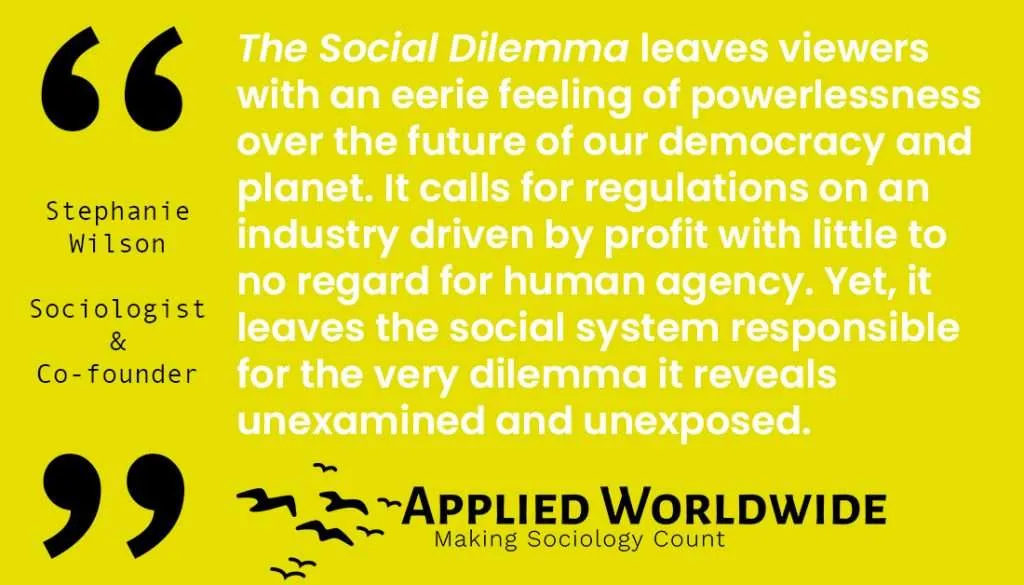When I first heard about The Social Dilemma, I was wary of giving into the hype around it. Based on what I saw from social media posts, it seemed like another overplayed documentary on how social media is the culprit of our societal depression and loneliness—but it was so much more than that.
Despite the underlying theme of the documentary being sociological—in that it’s a commentary on the impact of social media on society and our (in)ability to uphold our current state of democracy—I didn’t see a single sociologist on the screen over the hour and a half I spent staring at it. But, as a sociologist, I still spent that entire hour and a half making connections between the theories I’m versed in on society and the message behind The Social Dilemma.
Throughout that process, I couldn’t help but continue to think more and more like a Marxist sociologist who views capitalism as the central driver of inequality in our societies. In fact, my final impression of the documentary is that it is a critique on capitalism and the inevitable exploitation of human beings within that system.
Throughout the documentary, experts from the tech industry, addiction medicine, law, political science and more share their insight on the profit-driven industry that is social media. In this profit-driven industry that relies on advertisers, the users—you, me, our family, and our friends—become products to be consumed by advertisers who pay social media platforms for access to us, including all the data they’ve collected on us.
Capitalism, Exploitation, and Alienation
The first thing I learned about capitalism as a budding sociologist is that the system relies on exploitation of human labor to accumulate capital, or surplus profit. The second thing I learned is this unavoidable exploitation results in what social theorist Karl Marx called alienation, where workers don’t have access to the products they manufacture because exploitation leaves them without the necessary capital to access those products. In Marxist terms, capitalism ensures that workers are “alienated from the fruits of their labor.”
These ideas are rampant in the arguments made throughout the documentary, but no one brings them to fruition quite like Jaron Lanier—a computer scientist, philosophical author, and one of the many experts featured in The Social Dilemma.
Towards the end of the documentary, Lanier comments on the fact that users get nothing from the social media platforms that take, and take, and take from them. These platforms extract data upon data from us, but the only entities who benefit from that extraction are those platforms and the advertisers that keep them afloat.
As users, we aren’t compensated in any way for supplying countless variables of data for their continuous prosperity. In fact, according to The Social Dilemma, in supplying that data—knowingly or unknowingly—we are surrendering our agency to algorithms that manipulate our choices and behavior as humans. So, not only are we exploited for and alienated from the products of our labor (i.e., our data), but those products are actually actively working against our ability to maintain any semblance of free choice that exists.
The Social Dilemma of Capitalism
The intended take-home point of this documentary seemed to be more aligned with the existential threat of a profit-driven social media industry that remains unregulated than with my own take-home point of the toxicity of capitalism. Yet, even the intended take-home point reveals the very toxicity I am concerned with here. Are regulations necessary if accumulation of capital isn’t the goal?
Advertisers were introduced into this twisted business model in the first place for the sole purpose of capital accumulation. With the introduction of advertisers came data extraction and algorithms built to keep users using, both of which lead to hindered agency for users and the all-too-common echo chamber of social media. In other words, without the profit-driven system of capitalism, would this dilemma exist?
The purpose of posing this question is not to spark a series of “what ifs,” but rather to hone the idea that overarching social systems cannot be overlooked. If we overlook the social system in which this industry was built—the very system that drove it to make the profit-driven decisions it did—we risk history repeating itself through similar mechanisms in different industries.
The Capitalist System
Capitalism is all most of us have ever known. The industrial revolution that sparked the shift to capitalism took place over 200 years ago. Therefore, it’s not surprising that we blame the unregulated technology industry that we’ve seen develop and evolve in front of our very eyes, rather than the 200-plus-year-old social system that is all we have ever known. To use the words of Tristan Harris—co-founder of the Center for Humane Technology—which come from the very documentary I am critiquing here, “how do you wake up from the Matrix when you don’t know you’re in the Matrix?”
The Social Dilemma leaves viewers with an eerie feeling of powerlessness over the future of our democracy and planet. It calls for regulations on an industry driven by profit with little to no regard for human agency. Yet, it leaves the social system responsible for the very dilemma it reveals unexamined and unexposed.

I am the first to say corporate regulations are never a bad thing. But, as a sociologist, I am also here to say we ought to take a long, hard look at the social system that allowed this dilemma to play out before it finds another industry in the same profit-driven, exploitation-dependent economic structure that allowed it to prosper in the first place.
Behind Her Eyes: A Social Commentary on Sexuality and Gender Identity







